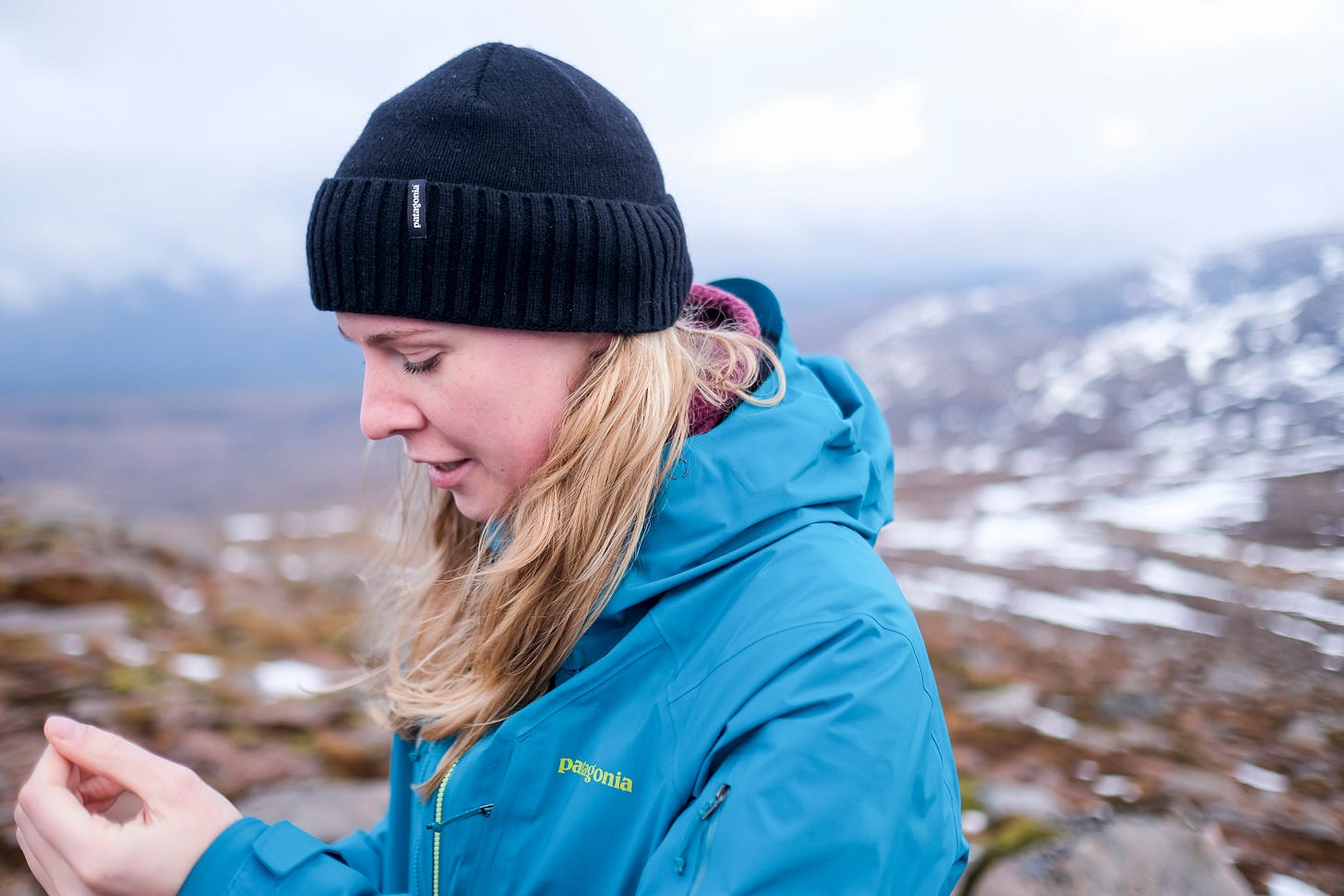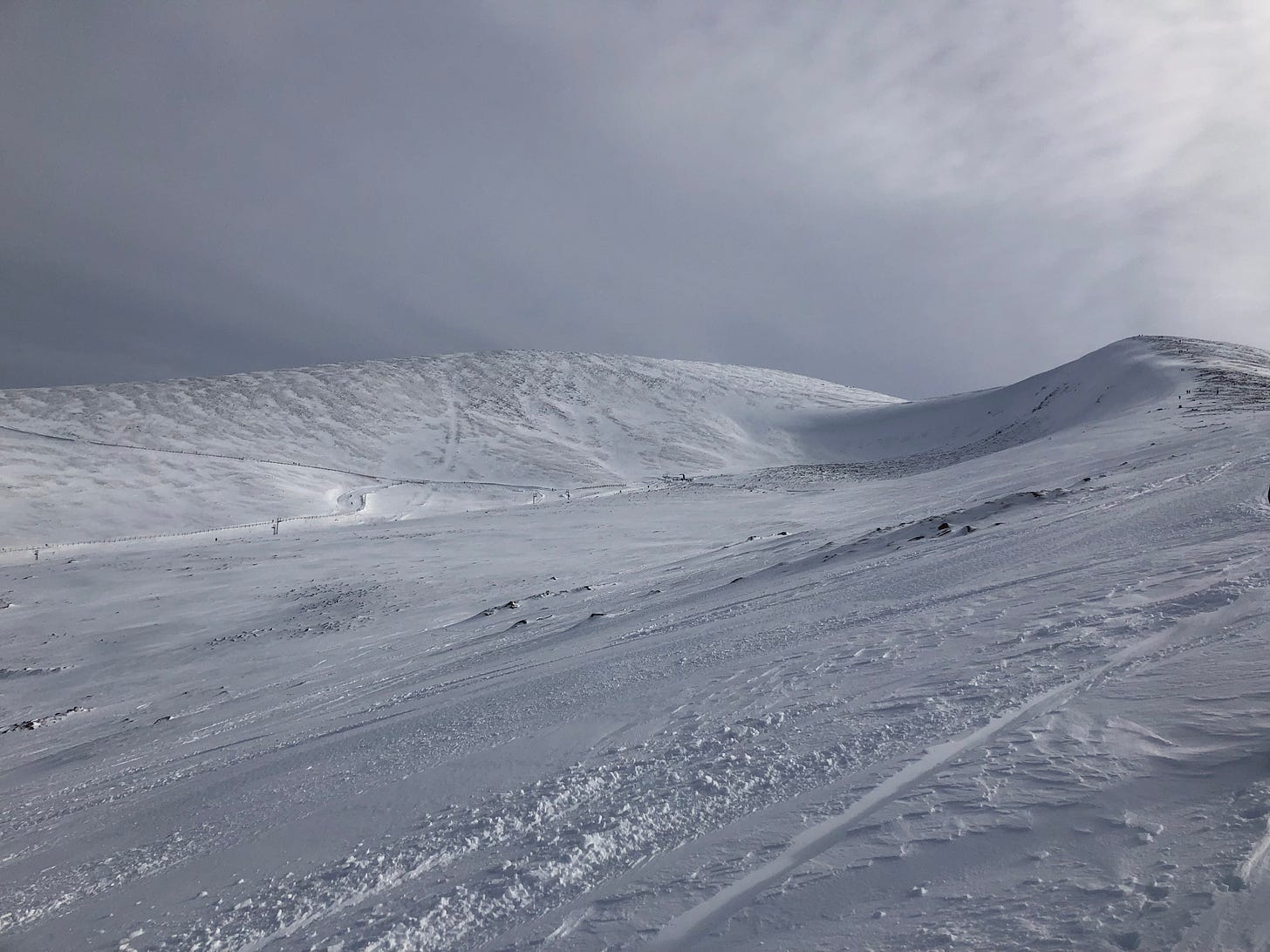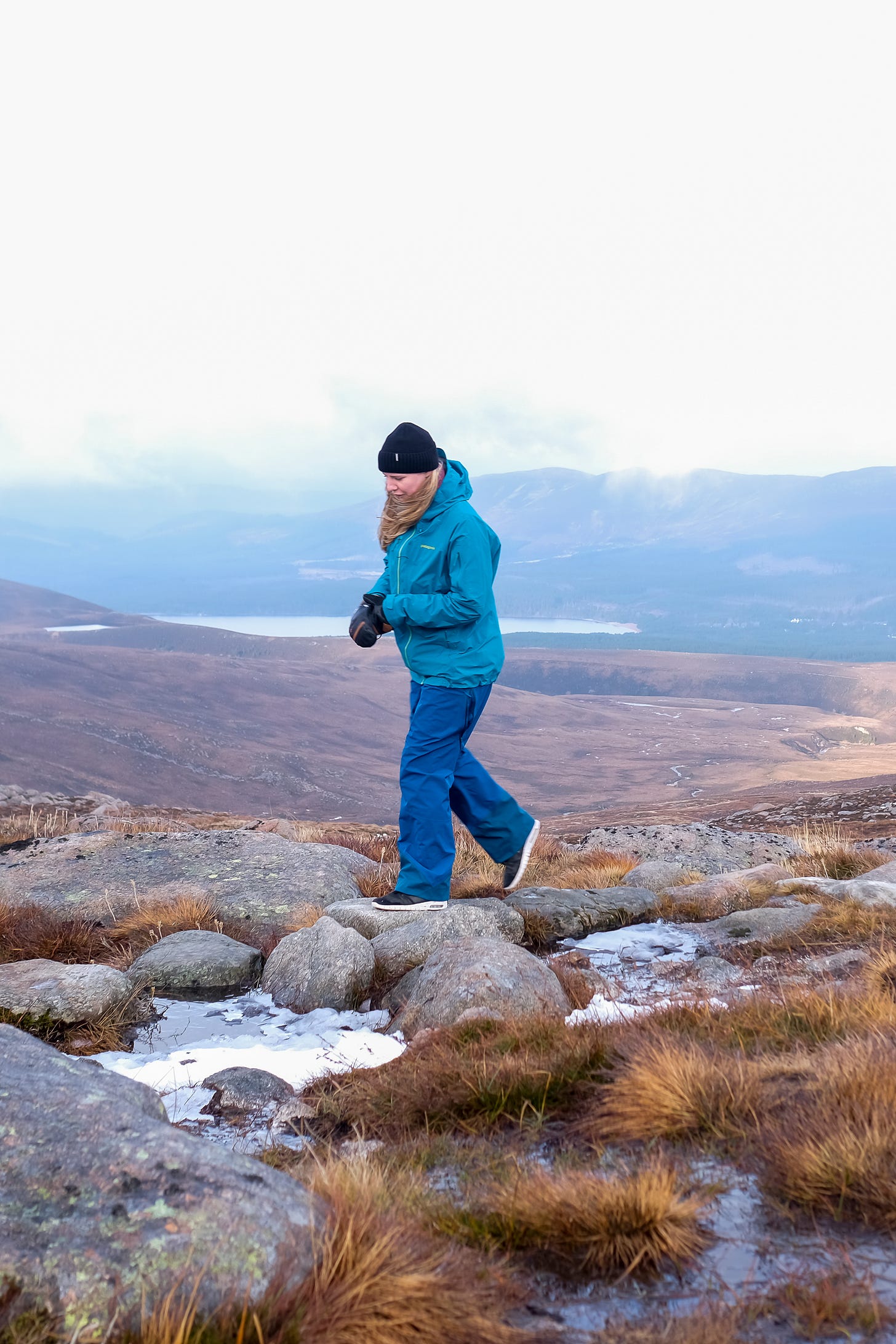“We’re in danger of losing that precious intergenerational knowledge of how things behave in the Scottish mountains.”
An interview with Lauren MacCallum, snowboarder, mountain biker & climate activist from the Scottish Highlands

“Because the weather conditions are changing so rapidly, we’re in danger of losing that deep and precious intergenerational knowledge of how things behave in the Scottish mountains.”
I first met Lauren around a decade ago, when Lesley McKenna (another Scottish hero) invited me to come splitboarding in the Cairngorms and Lauren, who lives in Aviemore, joined us too. It was blast in all senses of the word as we hiked headfirst into a proper Scottish gale and I got to see how central the outdoors is to the identity of this close-knit community.
Lauren is the General Manager of Protect Our Winters UK, an offshoot of the climate action charity founded by pro snowboarder Jeremy Jones. I’ve always admired her unique mix of eloquence, passion, and no-nonsense pragmatism when it comes to standing up for the outdoors. I hope you enjoy our chat.
Hey Lauren, diving straight in, can I ask how the climate crisis is affecting the Cairngorms?
We’ve always had extreme weather because of where we’re situated, we’re more of an Arctic than Alpine environment in that sense, but when you start putting extremes on top of extremes it’s really obvious to see.
We’re seeing more frequent dynamic changes in temperature, from minus 10 to plus 10 overnight, and then back to minus 15 and then plus 10 again the next day. Those shifts are starting to become more and more obvious. It makes navigating terrain more difficult and operationally it’s hard when the variables are changing so much, in terms of how much energy you need to plough and so on. It becomes harder to manage and more expensive.
When the climate crisis impacts mountain areas, it has knock-on effects on people’s mental and physical health. If the infrastructure can’t cope with extreme weather events, then you can’t get outside and access the hills and do the things that make you a healthy and happy person. When there’s no snow, no one is making money, the pubs and clubs are empty as no one is taking anyone out. You lose that social lubricant and buzz; everyone is just trying to get by.
And that brings with it a big cultural loss that’s hard to quantify, so when we talk about these impacts it’s important that we gather the cultural impact as much as the economic impact. People don’t go to church on Sunday, they go up the hill. The ski resort at Cairngorm Mountain is a community staple here, like a post office or pub or village hall. It’s where the drama happens, the socialising, the gossip… It's where people go to enjoy themselves and that’s a really important thing.
Is it leading people to move away from the area?
No, if anything after Covid more people are coming here. But because the weather conditions are changing so rapidly, we’re in danger of losing that deep and precious intergenerational knowledge of how things behave in the Scottish mountains. Those local data points that have been observed for a hundred years by grannies and grandads who’d spend decades on the hill and passed down.
It's becoming less predictable which is crazy, not even from a snowboarding point of view but from being able to go out and access the hill safely. It’s bad for business, and bad for people.
For a long time, we worried about the IPCC report projections but now the reality is playing out and then some. How do you feel about that?
I went to Chamonix in 2012 on a trip that was a real life-changer for me and then didn’t go back until 2019. I was in total disbelief and shock at how much the Glacier des Bossons had receded in those seven years. The Alps are warming at two degrees and that’s having catastrophic impacts on glaciers, which are not just there for us to have fun with, they’re really important and unique mountain ecosystems.
We need to think about everything that is downstream from that glacier, the drinking water it supplies, the agriculture, biodiversity, and infrastructure. When you see those impacts and the research related to the latest IPCC report, about things like water scarcity and the ethics of that going forward, it can be quite a frightening realisation.
Could ski resorts be doing more when it comes to the climate crisis?
100%. They hold big political and economic levers which could be really useful, but everyone is stuck in this perfection mode, where they’re scared to stick their head above the parapet [in case they get accused of not being perfect on all environmental measures]. But it just takes one or two to lead by example. Resorts have thousands of people coming through their doors, so they could be hugely impactful in terms of engaging with those people and educating them about the climate crisis and the work we’re doing at Protect Our Winters.
How about in Scotland?
In Scotland, our grid system is primitive and can be quite restrictive, the ski resort Glenshee, for example, is entirely off grid. There are huge amounts of things the resorts could do to work with communities and groups like Protect Our Winters UK to find those win-wins, such as getting renewable power at Cairngorm Mountain or Glenshee. We wouldn’t just make the operations of the resorts better; we’d also tackle fuel poverty in the Highlands at the same time.
I think there is huge scope for the resorts to work with their local community and the Scottish government to find those win-wins. To get a collective of like-minded people together who are driving solutions and find solidarity in each of those perspectives. That’s when we can be the most impactful instead of everyone pulling in slightly different directions.
Protect Our Winters UK recently published an open letter to British Cycling questioning whether a fossil fuel company such as Shell was an appropriate sponsor during a climate crisis. Why was that an important move?
Their actions are not matching their marketing speak. What is the value of gold medals on a planet that is uninhabitable? Our performing excellence has to match our ethical excellence and when you take a decision like this, the ethical excellence doesn’t add up.
As snowboarders, skiers, climbers, mountain bikers, hikers… we see the world differently, we see it in a unique way. We’re on the mountains, in the forests, on the water, and if we lose our playgrounds, where we go to connect and get so much from, then we lose our shared identity, our shared values. At Protect Our Winters UK, we’re asking people to be the allies of these wild spaces and not to align themselves with the values of big oil companies.
To find out more about Protect Our Winters UK & how to support them head here.
And this is a short film Lauren made with Marie France Roy and Alex Yoder about land access in Scotland & being an accidental activist.
Please fwd this newsletter to anyone who you think might be interested & if you want to commission me to write about any of these topics please get in touch.
Other news:
Earlier this year, I interviewed Portuguese big wave surfer Joana Andrade for Glorious. Big vs Small, a film about her life directed by Minna Dufton, is now screening at UK cinemas. Find out where to watch it here.
The new issue of Mpora magazine is out, including lots of great reads and a feature I did on why it’s harder than ever to do a snowboard or ski season in the Alps and why that matters. You can order the issue here.





